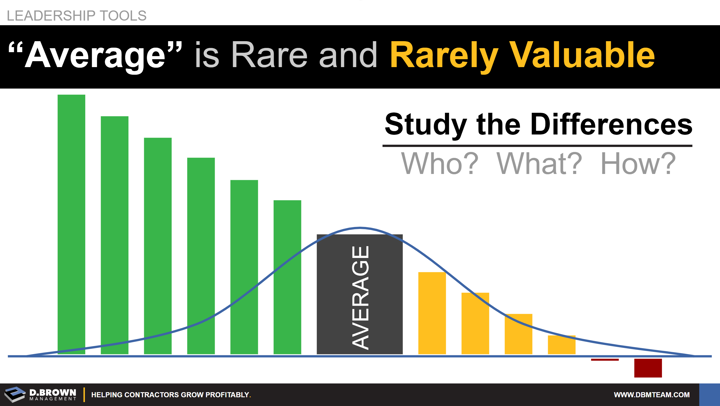Finding someone or something that is "Average" is actually very rare and rarely valuable.
Seeing how the average is trending can be very valuable to visualizing the trajectory, and that goes for every element on a Contractor's Scoreboard.
Whether it's in financial benchmark studies, economic forecasts, or unemployment statistics, realize both the value and the limit of averages and generalities. As Ray Dalio describes - get specific to solve problems.
Know the range between the average of the top 10% and the bottom 10%. This is where your reasonable range for improvement exists. If you don't know the range, you can safely assume that it is bigger than you think.
- GCs averaged 3% pretax net in 2018. To create that average, some contractors were operating at 5% and others were operating at 1%. Some were operating in the 8-10% range, while others operated near break-even or at a loss.
- For every market sector that falls, there are others that won't fall as much or are even growing. Even within a falling market sector, like multi-family housing, there will be developers that fall much faster than average and those that are actually growing.
- There are 20M or so people that are unemployed by COVID-19. There are also millions of others who are working 16-hour days.
Deeply study the differences between the top 10% and the bottom 10%. Regardless of where you fall in that range, you will be able to learn valuable lessons to keep improving. Knowing the principles of what you should never do is just as important as knowing what you should always be doing.
- If we accept this range as "just the way things are," then the trend of average never improves and will likely decline.
- If we each study the range and seek to copy the behaviors and actions of the top 10%, while avoiding the behaviors and actions of the bottom 10%, then we will collectively improve the average over time. This is great for everyone.
The range is not the problem. The range is natural and exists in all aspects of nature. Problems only occur if:
- We become resentful of the range in any direction.
- We rationalize away our own performance when we find ourselves in the upper end of the bell-curve. We are all standing on the shoulders of giants.
- We rationalize away our performance when we aren't in the upper end of the bell-curve. Some things happen by chance, but most are by choice.
- We don't aggressively work to improve ourselves and those around us.
- We try to artificially narrow the range in any way.
Remember the Dunning-Kruger Effect, where high-performers estimate their own capabilities lower and low-performers estimate their own capabilities higher. Be objective in your assessment of your own position and the position of others on the bell-curve of performance.
By everyone staying focused on improving beyond the current average, we will raise the bar for everyone. Hans Rosling does a great job of demonstrating this at the world level by looking at 200 countries evolving over 200 years, including wars and pandemics. It's great to watch, as this provides a much broader context for what we are working toward. Remember that truly moving the averages for the whole world requires creating real value and not transactional value.

